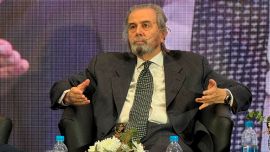On the day in which her guilty sentence was to be confirmed by the Supreme Court, Cristina Fernández de Kirchner woke up in her apartment located on Calle San José, in the neighbourhood of Constitución in Buenos Aires City, and made her way to the local headquarters of the Partido Justicialista (PJ). The former president had probably dreamt of the moment of her upcoming detention before, imagining crowds of frenzied supporters standing between her and the police forces, unwilling to allow their leader to be soiled by the dirty hands of the crooked security forces. In her imagination, the situation probably resembled the arrest of Brazilian President Luis Inácio Lula Da Silva, when thousands of members of his Steelworkers union stood guard in São Paulo’s industrial neighbourhood of São Bernardo do Campo as he initially disobeyed Judge Sergio Moro’s order. His own people stopped him from turning himself in, until – after two days of tensions – he walked out and voluntarily accepted his arrest. He would go on to spend 580 days behind bars until Brazil’s Federal Supreme Tribunal annulled Moro’s ruling, noting due process had been violated. He would go on to return to the presidency after Jair Bolsonaro’s divisive term in office.
Confirmation of Fernández de Kirchner’s guilty ruling came in the early evening, after hours of speculation. The guessing game started a few weeks ago, when the case docket began to make the rounds in the Central Courthouse ahead of what ended up being a unanimous decision confirming her involvement in the ‘Vialidad’ corruption case, in which she conspired with business associate Lázaro Báez and others to defraud the state. She has been sentenced to six years in prison and given a lifetime ban on holding any official post.
It has been evident for years that she would be found guilty, a fact that Fernández de Kirchner knew quite well herself. It led her to repeatedly lambast the Judiciary during the trial and rid herself of seizable assets, which were donated to her children, Máximo and Florencia. The question was whether Supreme Court Justices Horacio Rosatti, Carlos Rosenkrantz and Ricardo Lorenzetti would accept the prosecution’s request to consider the crime part of an illicit association, which would have elevated the prison sentence to 12 years. What was odd was the timing, which appeared to have been telegraphed ahead of time and effectively knocked Cristina out of the electoral process – after she had already announced her candidacy. An unwritten rule in the Supreme Court is that it doesn’t intervene in electoral processes. But something different happened here, forcing the tribunal to rule and accept it would be questioned for blocking one of Argentina’s most popular politicians from running. Internal rumblings of the highest political order as the triumvirate attempts to mask its fractures.
But Cristina is no Lula, particularly not when her intention was to run for the local legislature in the Buenos Aires Province. While extremely popular, Fernández de Kirchner’s massive rejection rate makes her an impossible candidate for a national election, something she acknowledged even in 2019 when she picked Alberto Fernández to head a united Peronist ticket against Mauricio Macri. Not only had she chosen this time out to run for a negligible post in a historic Peronist bastion, where the chances of losing were nearly zero, there was a chance that if Milei’s libertarian coalition La Libertad Avanza had put up a decent showing in the third electoral section, CFK’s grip on the PJ Peronist party would be loosened substantially. Some analysts suggested that was precisely Buenos Aires Province Governor Axel Kicillof’s strategy all along: let her suffer a symbolic loss, thereby forcing her to step aside. Risky business, if true.
Prior to and after the ruling, a small but noisy crowd spent those fateful hours chanting in support outside the PJ headquarters in San Telmo, a nearby Buenos Aires neighbourhood, many of whom followed her back to Calle San José that frigid night. Small groups blocked roads while one contingent of vandals roughed up the lobby of traditionally anti-Kirchner TV station TN (owned by Grupo Clarín, one of Cristina’s historical antagonists). Fernández de Kirchner has been given five working days to surrender herself at the Comodoro Py federal courthouse, after which she is expected to be temporarily detained in a special jailhouse before being granted home arrest.
Can this ruling be read in a positive light for the former president? To a certain extent, a final ruling in the ‘Vialidad’ case gives the former president some breathing-room, confirming the inevitability of her guilty sentence. It also takes her out of the petty political battle in the third electoral sector of Buenos Aires Province, limiting the potential of a humiliation if the coalition between libertarians and Macri’s PRO had a good showing in the ‘Conurbano’ ring of municipalities encircling the capital. Elevated to martyr status within the Peronist ranks, Fernández de Kirchner regains centrality at a key moment as Kicillof was gaining the upper hand in their stand-off for control of Peronist candidate lists. She can regroup and cry “lawfare” and proscription with cause while accusing Clarín strongman Héctor Magnetto of being the bad guy behind the conspiracy to bring her down. Nobody outside their party cares, but internally it would seem treacherous for anyone to confront her now. Kicillof must play a tactful hand if he is to outmanoeuvre her.
Interestingly the Milei administration appears to have been caught flat-footed by the news. With the President off on one of his frequent overseas trips to visit ideologically friendly leaders like Israel’s Benjamin Netanyahu (and don’t forget the receipt of more awards),the rest of the libertarian troupe was essentially speechless in the face of a historic political moment. Odd for a crew that often has verbal diarrhoea on social media and seeks to own anything and everything they happen to consider positive to their mission. Beyond Milei’s travels, the confirmation of CFK’s guilty sentence hits at the centre of the political strategy developed by controversial strategist Santiago Caputo. Pitting La Libertad Avanza against Kirchnerism is the key to the libertarian message, together with lowering inflation and other supposed economic triumphs. Counting on Cristina in an inconsequential local election allowed them to broaden their support base by nationalising the vote. A strong showing in September would give them momentum ahead of the real battle: October’s national midterm elections, particularly after a potent victory in Buenos Aires City, effectively dismantling Macri’s resistance and continuing the process of absorbing his party. The epic battle of defeating Kirchnerism once and for all is off the table, meaning they’ll have to come up with a new playbook. Challenging in a time of record low turnouts.
For Fernández de Kirchner, the judicial gauntlet is far from over. With ‘Vialidad’ finished and off the books, now she’ll have to face multiple other high profile cases including the ‘Cuadernos’ corruption notebooks investigation and ‘Hotesur/Los Sauces’ case, both of which put the focus on different elements of the corruption machine that operated during the Kirchner years. In her defence though, the judiciary had to go the distance (Federal Court, Appellates’ Court, Supreme Court) to convict the ex-president but didn’t end up making as strong of a case as it should. As specialist in constitutional law Andrés Gil Domínguez explained this week, the presumption of innocence wasn’t actually defeated by appealing to the use of a decree (Decreto 54/2009) to determine how public works budgets were assigned. While the corrupt scheme was well documented journalistically and much of the evidence is indicative, ultimately Argentina’s Judiciary followed its political inclinations all the way to the top.
The question is whether they would follow the same instincts if Mauricio Macri or Javier Milei were sitting on the bench of the accused. We’ll have to stay tuned.


















Comments